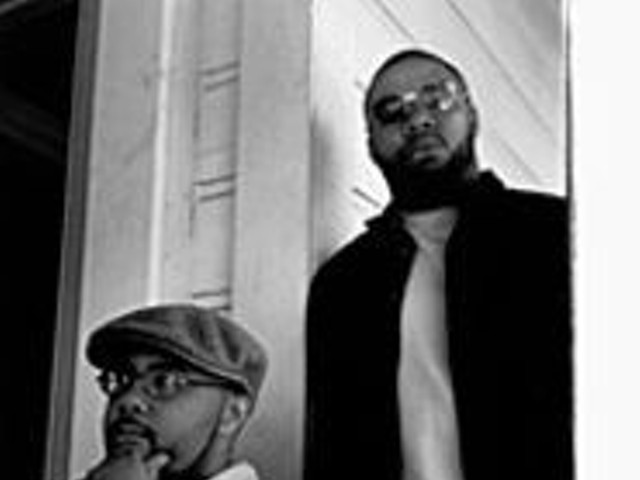Lovett's newest release, Anthology Volume One: Cowboy Man, is a curious document. It's presented as a retrospective of Lovett's country music, but it ignores his 1996 offering, Road to Ensenada, an album that was loudly hailed by Nashville critics as a welcome return to form, a celebration of his country roots. Lovett explains the release as an anthological homage to his beginnings; his first three albums specifically targeted a country audience, hence the "Cowboy Man" subtitle. Yet in the next breath, Lovett acknowledges that those first three records were an amalgamation of musical styles and so had to be combed through for their most countryish tracks. Such a process can provide fresh insight into an artist's past: "When you look back at your songs, you look back at your life. They all mean something different to me," Lovett notes. With its conscious avoidance of alt-country irony, perhaps Cowboy Man isn't truly representative of Lovett's exceptional range as a songwriter, but it remains a good sampling of Lovett's work in Nashville, which is another way of saying it's some of the best pop/country music of the 1980s.
Cowboy Man includes most of his early country Top 40 hits, augmented with a few that Nashville overlooked. Most inexplicably neglected at the time was Pontiac's beautiful "Walk Through the Bottomland," embellished with Emmylou Harris' harmonic counterpoint; here it's rightfully restored alongside more commercial tunes. Cowboy Man's most disappointing omission is Lovett's controversial (at least in Nashville terms) cover of Tammy Wynette's "Stand by Your Man," a track that once garnered him threats and boycotts. Further complicating the new release's agenda is the blatant grab for completists' dinero by way of the inclusion of two new songs: The aforementioned "Truck Song" opens the set and "San Antonio Girl" appears midway through, coupling some bouncy Texas swing with Lovett's familiar sardonic wit. The chorus -- "She ain't exactly white/But she's a little bit pretty" -- is PC-baiting at its swingingest. The formal shortcomings of the anthology don't detract from the staying power of the songs themselves, but nor do they shed any light on the future of Lovett's career.
Lovett is touring this time with his Large Band, a superlative ensemble that he first introduced in 1989 and one that he continues to lead confidently and generously. The Large Band includes keyboards, guitars, percussion, cello, a four-man horn section and a stellar vocal quartet, along with Francine Reed, who rivals Lovett for the spotlight more than once during a single show. Directing such a large group onstage, albeit a large group of consummate professionals, requires much more work of Lovett than more intimate acoustic performances. One aspect that's lost is extemporaneity; you can't impulsively introduce a song that requires horns when your horn section is lined up at the buffet (something that actually happened once when the band wasn't quite so polished).
Though playlists may be set in advance, the Large Band is anything but stale in concert. An entertaining live act, the Band comfortably mixes cello solos with steel guitar, gospel with country, lullabies to penguins with prayers to the bottle. In a recent interview, Lovett confessed, "Every time I stand onstage with the Large Band, it feels new to me. I guess I still think of myself as a guy with his guitar -- and getting to be up there with all those musicians, with the singers and the horn section, it's always a thrill to me. Every time I do it, it feels like a special occasion." Much as he revisits Nashville in Cowboy Man, Lovett is revisiting his first tour in 1986, when he first opened for Bonnie Raitt. Raitt, a fan of Lovett's work, continued to tour with him for several years, generously providing him access to her much bigger audience. Although Lovett and his Large Band will take the stage first, don't be surprised if he and Raitt play a few tunes together as the evening progresses.
Lovett acknowledges that he has been damned lucky to work with a company (MCA/Curb) that supports him as he follows his muse: recording the songs he wants, sequencing individual albums and determining the musical direction he feels best communicates particular songs. It's a license many fans no doubt wish he'd exploit. Whereas Lovett is charismatic enough as a performer that he doesn't need a new album to entertain his fans, audiences may wonder when he'll attend to his songwriting again. With no new full set of new material to listen to since 1996, fans and critics alike wonder what's up.
Granted, much of this year has been consumed by physical therapy as Lovett repairs a leg shattered in a ranch accident, but the only plans MCA/Curb has announced are for a possible October release of Anthology Volume Two composed of soundtracks he's recorded over the years. That's all well and grand, but it won't silence the doubters or satisfy the faithful who crave some substantive new material.
Perhaps Lovett is aware of the risky terrain on which he's been limping. Not alternative enough to hold the attention of the No Depression types, he's been increasingly gravitating toward the NPR crowd (if Lovett was afraid that a retrospective signifies aging, appearing on Morning Edition leaves no room for doubt). And if adult contemporary isn't the middle-aged wasteland it once was, it doesn't leave much room for what was once key to Lovett's songwriting -- an edgy sarcasm that earned him the label of misogynist but that also set him apart from the morass of singer/songwriters blurring into indistinguishable strum and whine. Thanks to an instantly recognizable voice that compensates for its unspectacular range with its character and impeccable phrasing, Lovett's been called the cowboy Sinatra. These vocal gifts have matured with him over the course of his career, but his ability to match the Chairman's staying power remains to be seen.





